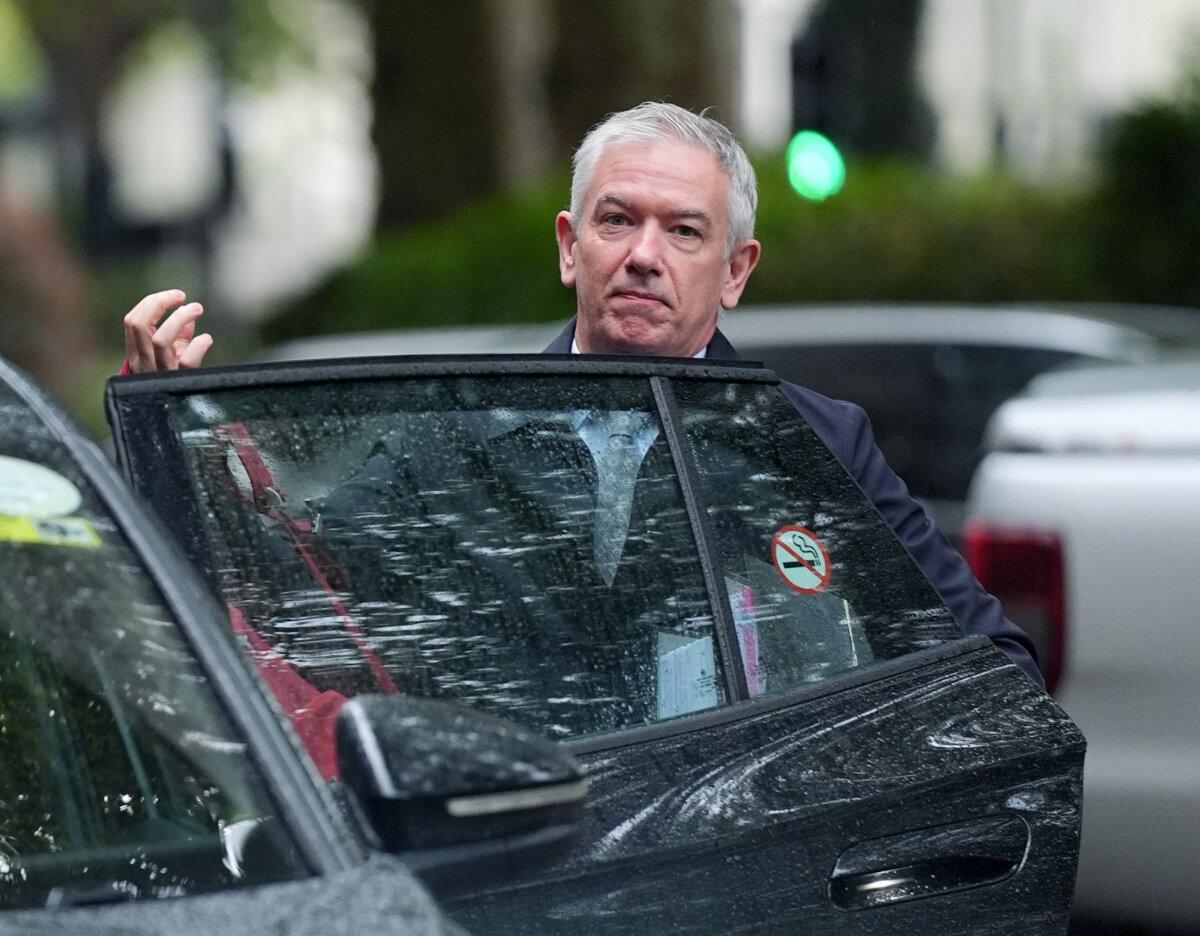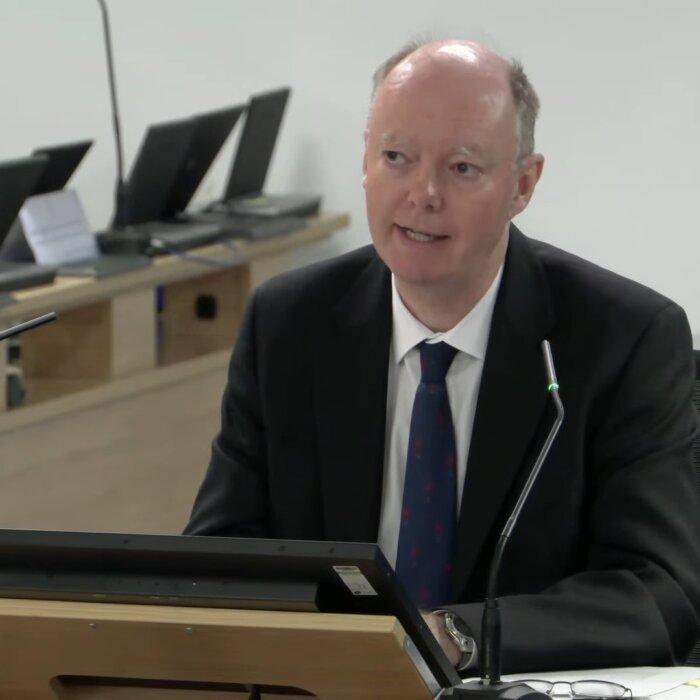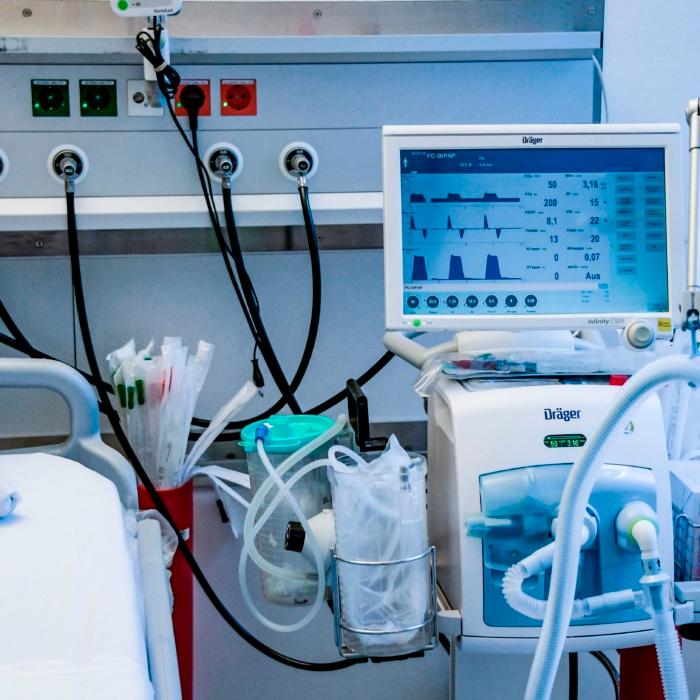Chief Medical Officer (CMO) Sir Chris Whitty said he knew nothing about the “inappropriate use” of “do not resuscitate” orders given to patients diagnosed with COVID-19 when he appeared before the UK Covid-19 Inquiry on Thursday.
Whitty was questioned by Aswini Weereratne, KC on behalf of COVID-bereaved families in Wales about the use of “do not attempt cardiopulmonary resuscitation” (DNACPR) notices and the use of clinical frailty scores during the lockdown era. The scores would determine which patients diagnosed with the virus should receive potentially life-saving treatment and which should be effectively left to die if they stopped breathing.
Weereratne told the inquiry, sitting in London: “At the onset of the pandemic, there was widespread reporting of unacceptable practices around DNACPR and the use of clinical frailty scores in the escalation of care and ceilings of treatment.
“It was made clear to health care professionals through various guidance and statements that it was unacceptable for advance care plans and DNACPRs to be applied to groups of people or on a blanket basis, and that decisions must continue to be made on an individual basis according to need.”
She asked Whitty, “Are you aware that the inappropriate use of DNACPR notices continued throughout the pandemic?”
Whitty, who was knighted in 2022 for services to public health, replied: “So firstly, to give an extremely clear statement that I completely agree that it is unacceptable to have blanket approaches to this, for multiple reasons, which I don’t need, really, to spell out, it is not normal practice medically, it’s not good practice.”
He said that “to be clear” he was in favour of advance care planning—an NHS term for when terminally ill patients or frail, elderly people approaching the end of life can give instructions as to how they wish to be cared for in their final months, or when they are unable to speak for themselves.
“I want to be clear that those are two separate things—blanket orders, absolutely not, [but] advanced care planning is a very useful thing to do.”
Multiple Witness Statements
Multiple documents have been submitted as evidence to the UK Covid Inquiry, chaired by Baroness Heather Hallett, alleging that patients—sometimes vulnerable people with disabilities—were given DNACPR notices without their knowledge or consent.Numerous witnesses who appeared before the Scottish Covid Inquiry in Edinburgh earlier this year gave hours of emotional testimony on how their loved ones had been given the notice, sometimes without their knowledge or consent, and with allegations made that some patients were pressured into accepting a DNACPR.
Weereratne pointed out that Whitty had not covered the matter in his witness statement to the inquiry, and said the basis for her question came from the Parliamentary and Health Services Ombudsman, who in his own witness statement, had made findings on the “inappropriate use of DNACPR notices.”
She asked Whitty: “Given that there was an early flagging of this issue, what was given to monitor compliance with the guidance, and to prevent inappropriate practices from occurring?”
Whitty replied: “Well, I mean, I think, other than the fact that I don’t think any responsible body did anything other than say that it’s the wrong thing to do, making clear that this was not an area which I was immediately responsible for, and therefore this isn’t the area where I was leading, and that’s not—you know, if I had been asked, I would have have made a very clear statement as I’ve just made, as I’m sure every senior clinician would, and [Scotland’s CMO] Sir Gregor Smith made the same thing yesterday in regards to Scotland, for example.”
“But this wasn’t an area that I was involved in, and therefore I’m unable to give you any more advice than you can get from reading your Ombudsman’s report and wider reportage on this.”
Weereratne told Whitty the bereaved families group she represents is concerned about the increased use of frailty scores within the NHS to “escalate” the use of DNACPR notices.
Whitty replied that the frailty score should have no bearing on the decision to apply a DNACPR, and that a decision not to offer someone major surgery because they are nearing the end of life process, for example, should not result in them being given such a notice.

Smith ‘Doesn’t Recall’ Warning
Earlier this week, when Sir Gregor Smith appeared before the UK Inquiry to answer questions about the situation in Scotland, he told barristers he “very strongly agreed” that there was “never any justification” for the blanket use of DNACPRs.Barrister Emma Price told him: “The inquiry understands there was a statement made on 7th April 2020 ... by a group of UK age sector organisations, including Scottish Care and Age Scotland, and they raised concerns that blanket decisions appeared to be being made around the care and treatment decisions around the care available to older and vulnerable people who had felt ‘pressurised’ into signing DNACPR notices.”
When asked whether he recollected this, Smith replied, “I do not recall the particular statement that you are referring to, actually.”
Module 3 of the inquiry, examining the impact of the COVID-19 response on the health care systems of the four UK nations, continues.







